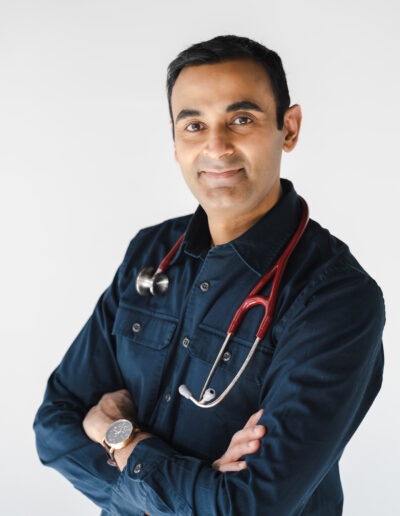Although there are many negative things that have happened in healthcare over the last couple of decades in terms of the medical practice environment, I am a real believer in one particular paradigm shift that’s occurred in our field. That’s the move towards patient-centered care and less of a high and mighty paternalistic approach from doctors. The ego-centric side of physicians might have, on some natural human levels, once enjoyed this—but when it’s you or a loved one on the receiving end of a paternalistic approach, things quickly change. As a whole, we doctors underestimate the intelligence level and self-awareness of our patients. The vast majority of the time, they already know the diagnosis themselves, and I frequently like asking my patients the question after I’ve talked to and examined them: “What do you think’s wrong with you?” (as I wrote about in this article). On that note, I wrote this piece some time ago, that I’m resharing. Physicians take heed:
————————————————————————————–
In the busy world of hospital medicine, where doctors and nurses find themselves rushed off their feet for most of the day, time to sit down and actually listen to patients is at a premium. Every doctor knows that our primary focus has to be on the most important aspects of the history and clinical examination in order to get to the correct diagnosis and treatment strategy. But at some point all of us would have also found ourselves driving home at night wishing that we had just a little more time to listen to our patients more attentively instead of cutting them off and rushing to get to that important point. When there is such a well-publicized push to improve “patient satisfaction”, one of the most common complaints from patients remains that their doctors simply do not spend enough time with them. Yet it’s not just a case of blaming the doctor either.
Contrary to addressing this problem, many of the bureaucratic requirements heaped upon doctors are in direct opposition to spending more time with patients — like needing to spend huge chunks of the day navigating inefficient computer systems and having mountains of regulations to deal with. A frequently cited statistic states that on average, a doctor only allows the patient to speak for anything between 12 and 23 seconds before interrupting them. Furthermore, during the course an average interaction, lots of things can also be simply passed off—much to the annoyance of patients (and again, it’s not always the doctor’s fault that this happens). There are, however, some things that in my experience patients tell you which should be carefully listened to and never ignored.
Here are 5 of them, and would be especially good for medical students and residents to know:
1. “These are exactly the same symptoms I had before.” This applies particularly to certain conditions such as chest pain. When a patient tells you that their pain or discomfort, no matter how unlikely it sounds, “Is exactly the same as when I had my last heart attack” — take it extremely seriously.
2. “The patient just isn’t quite himself.” If a loved one — be it a spouse, a parent, or a child — tells you that their relative has just “not quite been themselves,” this may sound like a very vague thing to say. It is therefore very easy to pass off in the absence of any other specific objective findings. But rarely will there be nothing wrong when a relative tells you this. Investigate it thoroughly. It could be a hidden infection, a neurological issue or an impending catastrophe. This is also the case when a nurse tells you that their patient “just doesn’t look right.” I can’t tell you the number of times I’ve heard of that being said in the presence of what appear to be stable vital signs, only to have that patient crash shortly afterwards.
3. “My medication did this to me.” There are countless potential medication side effects for every pill, affecting everyone differently due to our own unique metabolism. Sometimes patients will tell you that they know a certain medication made them feel a certain way. The symptom may sound unusual and not be a classic textbook side effect for that particular medication. Remember that nobody knows their own body better than the patient. If you hear this complaint, it’s almost always true.
4. “What happens if when I go home this happens?” “Oh, don’t worry — that’s very unlikely to happen Mr Smith!” When a patient is concerned about something happening when they leave the hospital, it often finds a way to happen! Address all concerns prior to discharge.
5. Complaints about noise and rude staff. Everybody in the service industry knows that a certain percentage of people are just terrible whiners — complaining about everything under the sun. At a time when people are unwell in the hospital, we may wonder why they would have reason to complain about something else other than their illness. However, nine times out of 10 when a patient brings forward complaints about issues such as rude staff, bad food, or too much noise, they are invariably justified.
These are five things that all physicians would have heard countless times. I hear these statements on a daily basis, and it’s the easiest thing to do to pass something off that sounds off the mark as being extremely unlikely or just plain nonsense. As doctors, we are trained to recognize the zebras and the 5 percent of unlikely happenings. When the patient is giving you the clue — listen.

Suneel Dhand is a physician, writer and speaker. He is Co-Founder at DocsDox.
Follow me on:
YouTube: Suneel Dhand
Instagram: suneeldhand
Twitter: @SuneelDhand
Facebook: Dr Suneel Dhand


No doubt – patient is the most valuable source of information when it comes to medical data gathering to establish a diagnosis.
Hello Dr. Dhand,
Before the end of the physician’s examination of the patient, the physician may want to examine the patients face. Look at what the patient’s face tells you. What is the patient NOT saying. What is troubling them about which they’re desperately hoping someone will ask them? What’s hurting them more than their obvious ailments? Obviously, this may open a “can of worms” and an “extensive” catharsis for which the physician has limited time. Nonetheless, this may reveal the “real” patient problem(s).
As a collorary to the above, I invite you to read some of the comments on Dr. Maurice Bernstein’s Preserving Patient Dignity Blog Volume 106 (Type Bernstein dignity 106 in the URL box). Some of the posters have been severely “harmed” by medical insensitivity. Although these individuals may be considered by some to be “over-sensitive” to bodily exposure, one could easily assert that health care has grossly overlooked the “sensitive” nature of “care” in the quest for efficiency ( and, possibly, cost saving). Their problems and the unspoken concerns referenced above will not be addressed until physicians are wiling to break the mold and take the time to ask, “What’s troubling you today? How can I ease your suffering and anxiety?” This will mean throwing away the timer in the exam room and telling admin that doctors are reclaiming their profession.
Fantastic points Richard, love those questions at the end to ask patients. Suneel